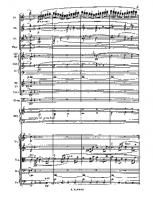Georges Bizet Sheet Music
 Georges Bizet (25 October 1838 – 3 June 1875) was a French composer and pianist of the Romantic era. He is best known for the opera Carmen.
Georges Bizet (25 October 1838 – 3 June 1875) was a French composer and pianist of the Romantic era. He is best known for the opera Carmen.Bizet was born at 26 rue de la Tour d'Auvergne in the 9th arrondissement of Paris in 1838. He was registered with the legal name Alexandre César Léopold Bizet, but he was baptised on 16 March 1840 with the first name Georges, and he was always known thereafter as Georges Bizet. His father Adolphe Armand Bizet (1810-86) was an amateur singer and composer, and his mother, Aimée Léopoldine Joséphine née Delsarte (1814-61), was the sister of the famous singing teacher François Delsarte.
He entered the Paris Conservatory of Music on 9 October 1848, a fortnight before his tenth birthday. His teachers there were Pierre Zimmermann (fugue and counterpoint; often assisted by his son-in-law Charles Gounod), Antoine François Marmontel (piano), François Benoist (organ) and, on Zimmermann's death, Fromental Halévy, whose daughter he himself later married. He won first prizes for organ and fugue in 1855 and completed his earliest compositions.
His first symphony, the Symphony in C, was written in November 1855, when he was seventeen, evidently as a student assignment. It was unknown to the world until 1933, when it was discovered in the archives of the Paris Conservatory library. Upon its first performance in 1935, it was immediately hailed as a junior masterwork and a welcome addition to the early Romantic period repertoire. The symphony bears a stylistic resemblance to the first symphony of Gounod, first played earlier in the same year, and which Bizet had arranged for two pianos although present-day listeners may discern a similarity to music of Franz Schubert, whose work was little known in France at the time the symphony was written.
In 1857, a setting of the one-act operetta Le docteur Miracle won him a share in a prize offered by Jacques Offenbach. He also won the music composition scholarship of the Prix de Rome, the conditions of which required him to study in Rome for three years. There, his talent developed as he wrote such works as the opera buffa Don Procopio (1858-59). There he also composed his only major sacred work, Te Deum (1858), which he submitted to the Prix Rodrigues competition, a contest for Prix de Rome winners only. Bizet failed to win the Prix Rodrigues, and the Te Deum score remained unpublished until 1971. He made two attempts to write another symphony in 1859, but destroyed the manuscripts in December of that year. Apart from this period in Rome, Bizet lived in the Paris area all his life.
Shortly after leaving Rome in July 1860, but while still touring in Italy, he had the idea of writing a symphony in which each of the four movements would be a musical evocation of a different Italian city – Rome, Venice, Florence and Naples. On hearing of his mother's serious illness he cut short his Italian travels and returned to Paris in September 1860; she died a year later. The Scherzo of the symphony was completed by November 1861, but it was not until 1866 that the first version of the whole symphony was written. He subjected it to a number of revisions through to 1871, but died before ever producing what he considered the definitive version. For this reason, the work is sometimes described as "unfinished", but this is an inaccurate description as it was fully scored. It was published in 1880 as the Roma Symphony.
Search for Free Sheet Music
You can make a search through the entire collection of sheets.
You can make a search through the entire collection of sheets.
Latest Artists
Fr Flotow
× 1
Ah Doe × 2
Thelonious Monk × 1
Chantal Kreviazuk × 1
Piyano × 1
The Cure × 1
Rent × 1
Stephen Flaherty × 1
Borodin × 1
Trova Yucateca × 1
Nicola matteis × 1
Emilio Chamorro × 2
Magnus Pålsson × 1
Isaac Albeniz × 3
Damien Rice × 1
Lauv × 1
The Beatles × 7
Michael McLean × 1
Bob Dylan × 2
Dolores O'Riordan × 1
Michael W. Smith × 1
Mathilde Santing × 1
Zequinha de Abreu × 1
Bob Chilcott × 1
Horowitz Mussorgsky × 1
Real Book × 1
Bob Elgin × 1
Lev Zemlinski × 1
Francis Lai × 1
Cole Porter × 2
Charles Griffes × 1
UB 40 × 1
Chabrier × 1
Zucchero Fornaciari × 1
The Academy Is × 1
Dream Theater × 1
John Forster × 1
Ivo Cruz × 1
Chopin × 5
The Dresden Dolls × 1
Jason Mraz × 1
ost × 1
Norman A. Agatep × 1
Kingdom Hearts × 2
north royalton community band × 1
Ira Gershwin × 1
Dvorak × 1
Giuseppe Cappotto × 1
Moulin Rouge! × 1
Michael Kamen × 1
Ah Doe × 2
Thelonious Monk × 1
Chantal Kreviazuk × 1
Piyano × 1
The Cure × 1
Rent × 1
Stephen Flaherty × 1
Borodin × 1
Trova Yucateca × 1
Nicola matteis × 1
Emilio Chamorro × 2
Magnus Pålsson × 1
Isaac Albeniz × 3
Damien Rice × 1
Lauv × 1
The Beatles × 7
Michael McLean × 1
Bob Dylan × 2
Dolores O'Riordan × 1
Michael W. Smith × 1
Mathilde Santing × 1
Zequinha de Abreu × 1
Bob Chilcott × 1
Horowitz Mussorgsky × 1
Real Book × 1
Bob Elgin × 1
Lev Zemlinski × 1
Francis Lai × 1
Cole Porter × 2
Charles Griffes × 1
UB 40 × 1
Chabrier × 1
Zucchero Fornaciari × 1
The Academy Is × 1
Dream Theater × 1
John Forster × 1
Ivo Cruz × 1
Chopin × 5
The Dresden Dolls × 1
Jason Mraz × 1
ost × 1
Norman A. Agatep × 1
Kingdom Hearts × 2
north royalton community band × 1
Ira Gershwin × 1
Dvorak × 1
Giuseppe Cappotto × 1
Moulin Rouge! × 1
Michael Kamen × 1































































